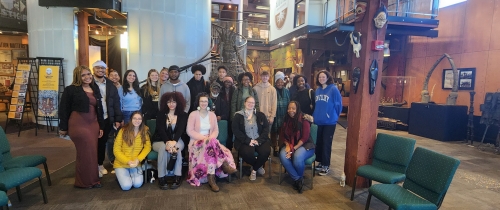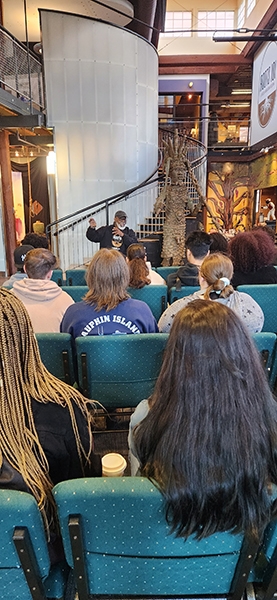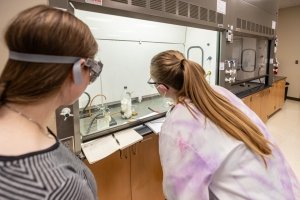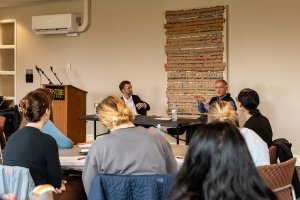
Centre students examine the role of Black Women and Contemporary Society
For Johnna Claude, the lessons learned during the CentreTerm course Black Women and Contemporary Society are ones she plans to implement in her life moving forward.
“I will take away the knowledge I've learned about the Black feminist theory and spread awareness about it to my community,” said Claude ’26. “I believe that is a wonderful platform to talk about our shared experiences and find the healing notions.”
The goal of the Black Women and Contemporary Society course, led by Assistant Professor of Sociology Kiyona Brewster, was to study the evolution of Black feminist thought and its contemporary applications in the areas of family, work, health, social activism, spirituality, sexuality, politics, and pop culture.
“Black feminism, like all branches of feminism, provides a theoretical framework to engage in deep critical thought about the roots of gender inequality within society,” Brewster said.
To that end, students reviewed the works of Black feminist scholars such as Audre Lorde, Patricia Hill Collins, Angela Davis, Bell Hooks, Brittney Cooper and Barbara Smith, among others.
“Taken together, Black feminist theory provides an opportunity to examine and discuss the unique struggles for equality that Black women continue to face in many areas, including

religion, family, labor, love, parenting, body politics, reproductive justice and art,” she said.
According to Brewster, the content of this course focused on the lives and experiences of Black women, mostly within the United States. That focus allowed students from any field of study, not just anthropology and sociology, to benefit from taking the course.
“I hope that students walk away with a firm understanding of the history and development of Black feminist thought, a better understanding of themselves, and a stronger ability to engage in conversations about gender equality through an intersectional lens,” Brewster said.
During the class, Claude discovered an aspect of Black feminism she had not previously considered.
“The most surprising concept that I learned is the history of fat phobia and how it dates back to the way people used to view Black women in the past,” she said. “There is still a racial bias against what a healthy body looks like. This is because of the influence of public health politics. I find it sad that biomedicine continues to encourage this by using BMI (body mass index).”
Another component of the course was considering methods of self-care and ways to best incorporate them into their lives.
“Since one key tenet of Black feminism is its activist thrust, I asked students to consider how they might take better care of themselves and of one another,” Brewster continued. “I challenged them to use the lens of some of the authors we read to design and offer a ‘radical self-care’ workshop, open to the campus.”
Claude based her workshop on Audre Lorde’s teachings on the erotic.
“For my self-care workshop, we advocated different self-love methods by sharing our recommendations and relating them to the course,” Claude said. “For example, music as expression, meditation to reflect, and lastly, winding down by binge-watching shows, each of which, Lorde would agree, is efficient with connecting with one’s self and feelings; so much so they can build self-efficacy and a resilience to battle against adversity. The plane of love allows one to think about one's own self.”
Brewster’s class also traveled to Louisville to experience African American history by touring the Roots 101 African American Museum. They practiced analyzing cultural objects and artifacts through a Black feminist lens. The class experienced current exhibits that focus on Black family life, art, music and community activism, followed by some soul food at Franco’s restaurant.
Above: Kiyona Brewster and students in her CentreTerm course, Black Women and Contemporary Society, pose at Louisville’s Roots 101 African American Museum.



